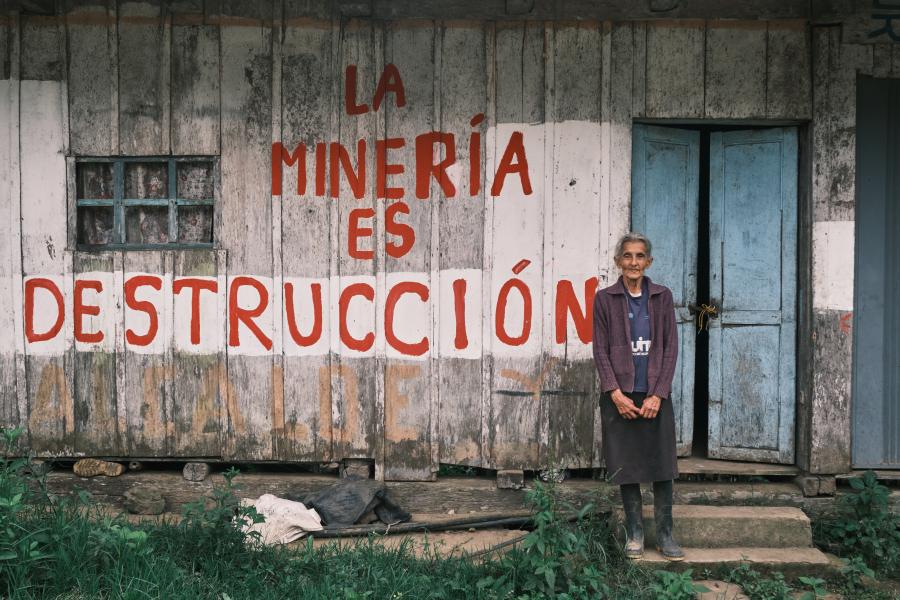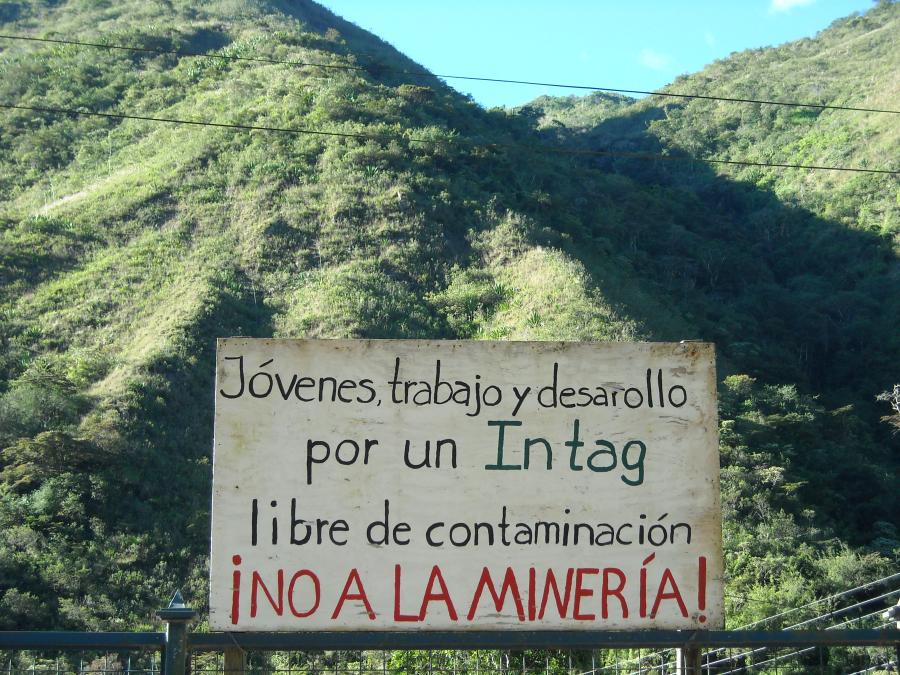
In 2012, the Inter-American Court of Human Rights ruled in favor of the Sarayaku in the case of Sarayaku v. Ecuador, affirming and upholding the right of free, prior and informed consent (FPIC) of Indigenous Peoples along with the standards for its application. The ruling marks the end of a decade-long legal battle the Sarayaku have been fighting since a foreign oil company was allowed to encroach on their traditional lands in the 1990s. By ruling for the Sarayaku, the Inter-American Court agreed that the community’s territory, life, and culture were threatened because the state had imposed an oil project without previous consultation or consent.
As Mario Melo, attorney for the Kichwa people of Sarayaku, explains, the ruling is significant for Indigenous Peoples “because it is a binding sentence for the Ecuadorian State and sets a mandatory precedent for the countries in the Organization of American States.”
The Inter-American Court had previously established the standard for the need to obtain consent of Indigenous Peoples in the case of Saramaka v. Suriname, which is the first binding international decision to recognize Indigenous Peoples’ rights to the natural resources located in their lands. The ruling said that whenever large-scale development will have a significant impact within Indigenous territory, the state has the obligation to obtain FPIC with respect for their culture and traditions. Sarayaku v. Ecuador further affirms this right.
The Sarayaku People
The Sarayaku (Kichwa for “river of corn”) are an Indigenous Peoples who live in several villages along a stretch of the Bobonaza River in the province of Pastaza in the southern part of the Ecuadorean Amazon. Their population is estimated between 1,000–2,000 on the self-governed territory called Tayjasaruta, or “Autonomous Territory of the Original Kichwa Nation of Sarayaku.” The Sarayaku lead a self-reliant life. They rely on local subsistence and their main sources of income are fishing, farming, hunting, and in recent years, ecotourism.
This traditional way of life has been under threat, however, since large oil reserves were found on their ancestral lands nearly two decades ago. Petroleum is of great value to the Ecuadorian state, whose economy is highly dependent on income from crude oil export. The Sarayakus’ land was allotted into an oil concession by the Ecuadorian government, and a concession was granted to Argentine oil and gas company Compania General de Combustibles (CGC) in 1996 without any process of consultation or consent from the community. Government pressure and aggressive company tactics led to multiple confrontations and rampant rights abuses.
Fearing that any attempt to drill on their land would destroy their unique way of life, the Sarayaku mounted an international campaign to keep the oil companies at bay. The community strategically built a network of international allies drawing upon human rights and the UN Declaration on the Rights of Indigenous Peoples. For the Sarayaku and other Indigenous Peoples in the region, the “imposed oil activity on Sarayaku territory meant militarization of their territory, environmental destruction, violence, and loss of elements their culture and spiritual cosmologies.”
In 2003, the Sarayaku community brought their case to the Inter-American Commission on Human Rights, which recognized that human rights violations had occurred including detention and torture of four community leaders by the Ecuadorian military and police at a CGC facility. The Commission issued precautionary measures to the Ecuadorian government for the removal of a river blockade and the clearing of 3,000 pounds of explosives left by the company after failed seismic surveys. However, the Ecuadorian government categorically ignored these measures, and allies of CGC proceeded to block the Bobonaza River to pressure the community to desist in the legal actions taken and to begin direct negotiations.
The following year, representatives of the Sarayaku successfully petitioned the Inter-American Court of Human Rights to issue provisional measures to the Ecuadorian government. Three years later, in late 2007, the Ministry of Mines and Oil began steps to remove the explosives—retrieving only about 10 percent of the amount in the ground. On May 8, 2009, again without consultation, the Ministry of Mines and Oil authorized a new opening of oil operations in spaces in which the Sarayaku, Shuar, and Achuar people have all opposed exploitation.
In January 2010, the Inter-American Commission on Human Rights turned the Sarayuku case over to the Inter-American Court of Human Rights for a final ruling. Sarayaku community members travelled to Costa Rica to testify about the human rights violations perpetrated on their communities, and in 2012, the Court conducted its first-ever onsite visit to an Indigenous territory. During this visit, the Judicial Secretary of State of Ecuador offered the Sarayaku a deal to repair damage and pay compensation. The Sarayaku refused the government’s offer before the Court issued its ruling.
Free, Prior and Informed Consent (FPIC)
One of the most important rights included in the UN Declaration on the Rights of Indigenous Peoples is the right to FPIC. Essentially, this means that mines, dams, oil wells, industrial agriculture and other policies, programs, and projects cannot be forced on Indigenous Peoples without their agreement, in advance; without coercion; and only after full disclosure of intent and consequences. While the Declaration is a major step forward in recognizing and protecting Indigenous rights, such documents represent the ongoing aspiration and declarative process for building international legal norms and pressuring states to move in certain directions. Over time, such declarations can become customary law as people assert those rights and countries gradually incorporate these rights into national law through case law or legislation. However, states and corporations have generally resisted the Indigenous “veto”—the right to simply say no to removal, unwanted development, or harmful legislation.
It is not surprising, therefore, that many Indigenous communities still struggle to claim their rights to FPIC when development projects threaten their human rights, their land, or their culture. The Sarayaku ruling is an important milestone for Indigenous Peoples’ right to FPIC and will have a major impact on the region and the world. “The court has been very clear and reiterative regarding the consultation process; they have repeatedly conveyed that consultations should be conducted in good faith following appropriate cultural procedures and must aim to reach agreement,” says Mario Melo.
The court also clarified that consultation does not constitute a mere formality, but instead should be a “true instrument of participation... responding to the ultimate goal of establishing a dialogue between the parties based on principles of mutual trust and respect, and with the view to reaching consensus between them.” The ruling further states that “consultations should be conducted in good faith following appropriate cultural procedures and must aim to reach agreement.”
Sarayaku leader Jose Gualina said, “the Sarayaku are extremely satisfied with this victory reached thanks to the efforts of our people and thehelp and solidarity of organizations devoted to the rights of Indigenous Peoples.”
Free, Prior and Informed Consent (FPIC)
FPIC is the principle that a community has the right to give or withhold its consent to proposed projects that may affect their lands and communities. This principle is protected by international human rights law as “all peoples have the right to selfdetermination” and “all peoples have the right to freely pursue their economic, social and cultural development.” It is enshrined in the ILO 169 (which only 22 countries have ratified to date) and the UN Declaration on the Rights of Indigenous Peoples (Article 32), which states:
1. Indigenous Peoples have the right to determine and develop priorities and strategies for the development or use of their lands or territories and other resources.
2. States shall consult and cooperate in good faith with the Indigenous Peoples concerned through their own representative institutions in order to obtain their free and informed consent prior to the approval of any project affecting their lands or territories and other resources, particularly in connection with the development, utilization or exploitation of mineral, water or other resources.
3. States shall provide effective mechanisms for just and fair redress for any such activities, and appropriate measures shall be taken to mitigate adverse environmental, economic, social, cultural or spiritual impact.


